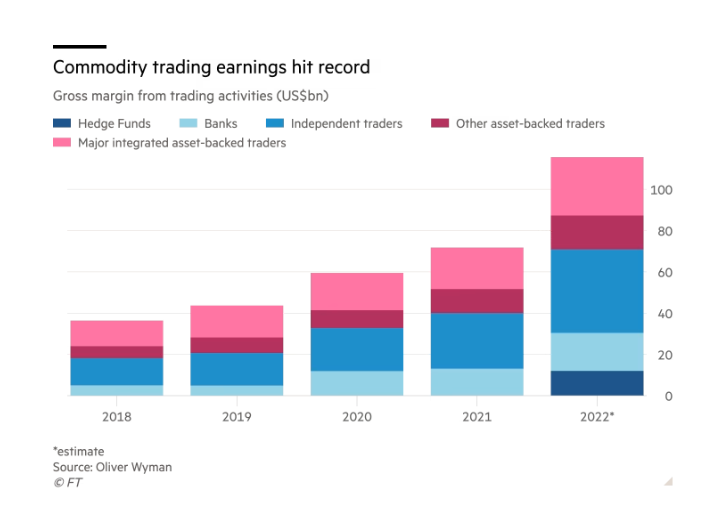Have you ever wondered why Switzerland, renowned for its alpine landscapes and watches, is also a titan in the global commodities market?
Discover how this hub of trading activity can impact your investment portfolio and learn how to get involved with this lucrative sector.
Need to Know
- Switzerland is the global epicenter for commodity trading, controlling 35% of the oil market, 60% for metals, 50% for cereals, and 40% for sugar, even with its limited natural resources.
- Swiss commodity companies are unique as they not only trade but also extend their activities along the entire value chain, from owning mines and oil exploration rights to running vast networks of petrol stations.
- The Swiss commodity sector, often operating under the radar, eclipsed the financial sector in profits for the first time in 2022, signifying its stealthy yet substantial influence on the country’s GDP.
Why Switzerland for Commodities?
Switzerland's stature in the commodities market is not just a product of its robust economic policies and high quality of life. It's also shaped by a regulatory framework that has historically provided a fertile environment for trading firms.
The country's policy of neutrality, coupled with favorable taxation and discreet regulatory oversight, has attracted the world’s leading trading houses to set up shop amidst its mountainous terrain. When combined with a formidable financial sector and strategic European location, has turned Switzerland into a beacon for commodities trade, influencing prices and markets across the globe.
From Geneva's bustling trading floors to the quiet efficiency of Zurich's finance houses, Switzerland commands a pivotal position in the trading of precious metals, energy, and agricultural products.
Switzerland's Top Traded Commodities
It's important to note that while Switzerland's trading activities are extensive, the commodities themselves rarely touch Swiss soil. This unique aspect of the Swiss trading system highlights the country's role as an intermediary in the global commodities exchange, rather than as a direct supplier or consumer.
Gold shines at the forefront of Switzerland’s portfolio of commodity trading operations, with Switzerland not just trading but also refining a major portion of the world's supply. The presence of major refineries like Valcambi SA and Metalor Technologies SA underscores the nation's dominance in this sector.
Aside from gold, Switzerland is a nexus for the trade of a variety of other metals and minerals. Copper, zinc, lead, nickel, and iron ore transactions are orchestrated here. This market prowess is bolstered by the presence of heavyweights like Glencore and Trafigura, which have a hand in controlling a significant share of European and global trading.
When it comes to energy commodities, Switzerland's role is equally notable. Geneva, serving as the unofficial European oil trading capital, sees an array of energy products, including crude oil and gas, traded in vast quantities.
The country's reach extends to agricultural commodities as well, with grains such as wheat, soybean, and corn traded alongside coffee and sugar. This sector is influenced by renowned companies like Cargill and ADM, which have substantial operations based in Switzerland.
Commodity trading has seen a boom in recent years, with profits among the major players, including hedge funds and independent traders, many of whom are in Switzerland, reaching a record high in 2022.

Getting Started with Commodity Trading
Commodities can be an exhilarating way to engage with the global markets. Here's a brief guide to help you begin:
How to Get Started
- Equip yourself with knowledge about commodity markets and the factors that drive prices, such as supply and demand dynamics.
- You can open an account with FlowBank, a regulated broker that provides access to Swiss commodity markets and educational resources suitable for beginners.
- Practice with a demo account to gain experience. This risk-free setting allows you to get a feel for the market’s movements and the mechanics of trading.
Understanding Leveraged Commodity Trading with CFDs
Contracts for Difference (CFDs) are a type of derivative trading that lets you speculate on the rising or falling prices of commodities without owning the actual asset. Here's what you need to consider:
Leverage allows you to gain significant market exposure with a relatively small initial deposit, known as margin. CFDs provide access to a wide range of commodities, from oil to gold, without the need to physically hold the asset. You can take advantage of markets that are both rising and falling, providing opportunities in various market conditions.
Just as leverage can magnify gains, it can also multiply losses, potentially leading to a loss of more than your initial investment. Commodities can be highly volatile; swift price changes can result in quick profits or losses. Holding CFD positions open overnight can incur additional costs, which can eat into profits or increase losses.
In Summary
You should now better grasp Switzerland's pivotal role in global commodity trading, touching on its diverse trading portfolio and deep economic impact. We've guided beginners on how to start trading commodities, particularly through leveraged CFDs, highlighting the balance of opportunities and risks inherent in this volatile investment landscape.
*The information contained on this page does not constitute a record of our prices, nor does it constitute an offer or solicitation for a transaction in any financial instrument. FlowBank SA accepts no responsibility for any use that may be made of these comments and for any consequences that may result therefrom. Any person who using it does so at their own risk.




